The Blurb (from Goodreads):
On 24 November Yasmin and her ten-year-old daughter Ruby set off on a journey across Northern Alaska. They're searching for Ruby's father, missing in the arctic wilderness.
More isolated with each frozen mile they cover, they travel deeper into an endless night. And Ruby, deaf since birth, must brave the darkness where sight cannot guide her.
She won't abandon her father. But winter has tightened its grip, and there is somebody out there who wants to stop them.
Somebody tracking them through the dark.
My Thoughts:
A gripping psychological thriller, The Quality of Silence is on my list of recommended reads for my Cotswolds writing retreat students. I asked them all to read it because it is such a brave and unconventional crime novel. One of the things I really want to do is encourage my students to read more widely and to take more risks with their writing. Rosamund Lupton is one of the most daring crime writers around, and there is much to learn from her.
What is so audacious about The Quality of Silence?
Firstly, the protagonist is a ten-year-old deaf girl named Ruby. She can only speak with her hands, or if she types into a voice-generating computer. She can only understand others if they use sign language, or if they articulate so slowly and clearly that she can read their lips. In darkness, she is both deaf and mute.
Secondly, the book is set in Alaska in winter. The sun sets in November and does not rise again until late January. Sixty-seven days of darkness. And Ruby and her mother Yasmin are alone in this bitter-cold wasteland. The two of them, hurtling along a treacherous icy road in a snowstorm, the only source of illumination their dipping, swaying headlights. And the headlights of the truck that is following them. It is the most intense and claustrophobic setting imaginable.
Thirdly, Rosamund Lupton is not afraid to switch points-of-view, or to jump backwards and forward in time, or to leave a whole page empty with nothing but a single full-stop upon it.
It’s virtuoso writing, and so unusual to find it in a genre that demands narrative pace and tension. I can’t wait for her next book (rumoured to be released in late 2019).
Another great read is Lost Man:
https://kateforsyth.com.au/what-katie-read/book-review-the-…-man-jane-harper
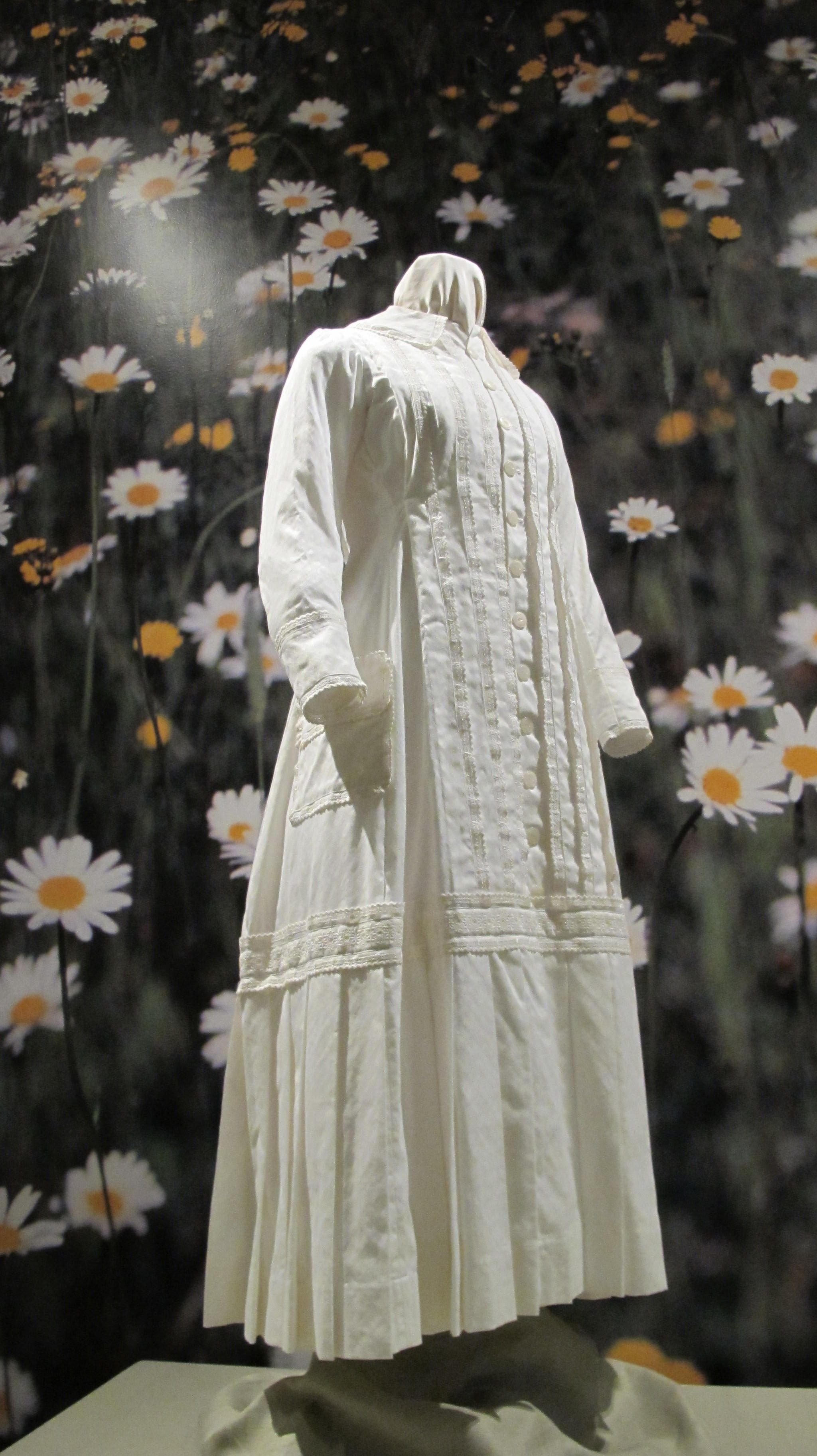
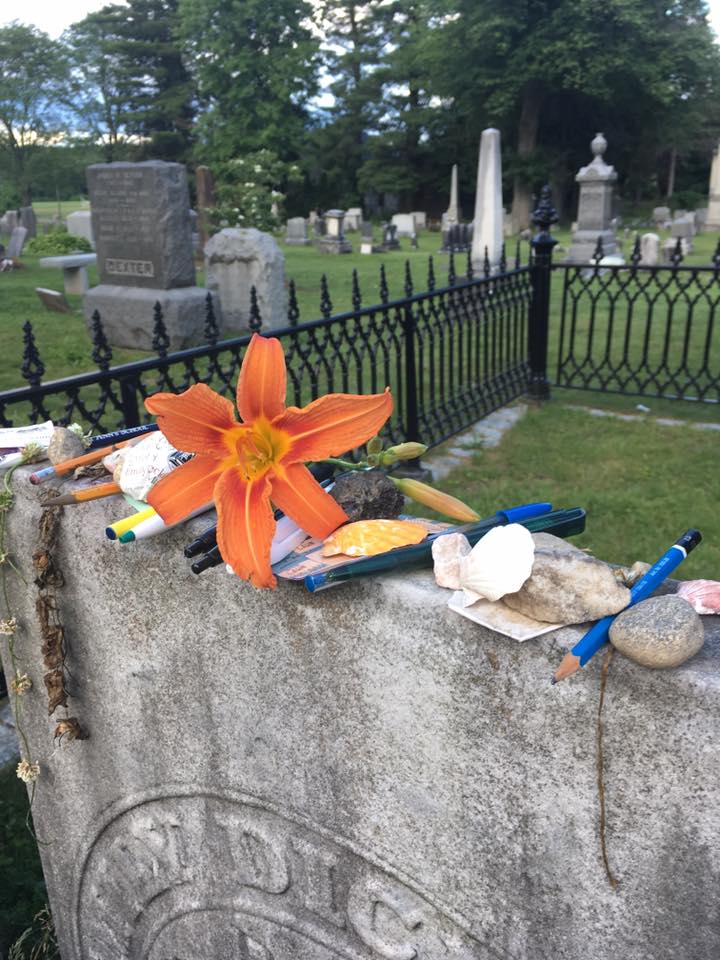
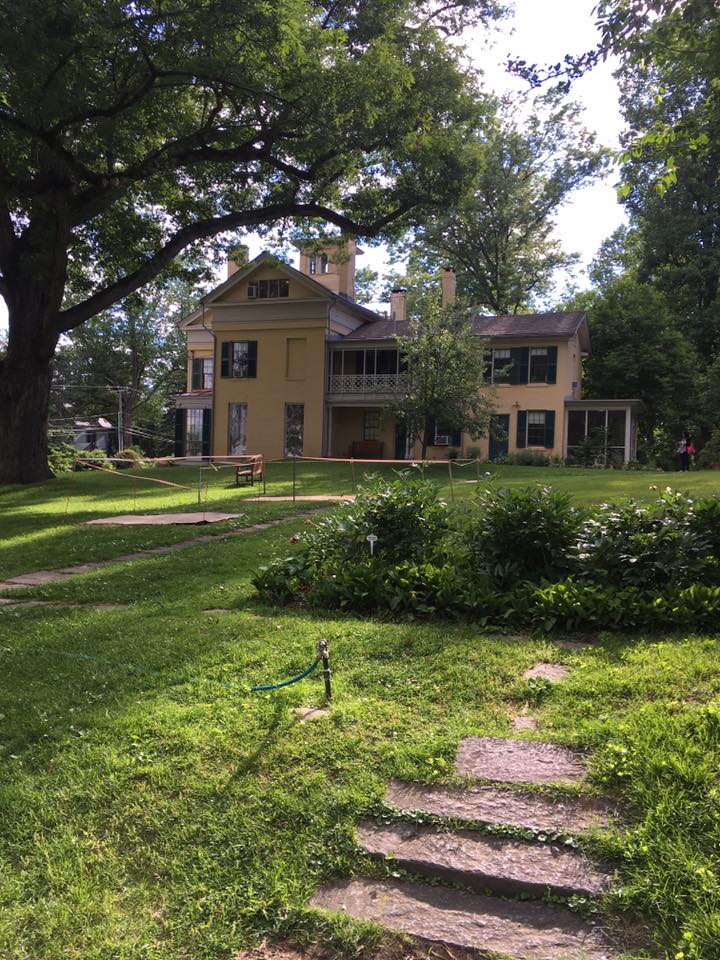
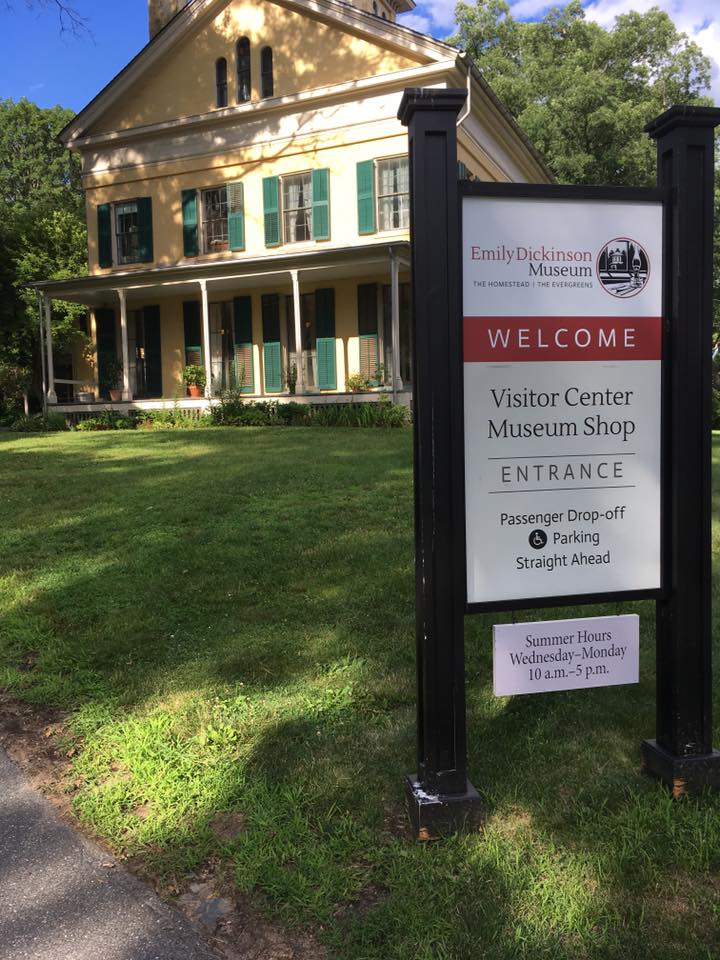
I have a page on my website I call The 50/50 project. It’s a list of 50 things I want to do before I die (though some of them are most unlikely to happen!)
I’m gradually ticking things off. In late June 2017, I managed to make one lifelong dream come true: I made a pilgrimage to Amherst to visit the home of one of my favourite poets, Emily Dickinson.
I have been intrigued by her life and work ever since my high school English teacher told me that she had written 1800 poems, many of which were discovered after her death by her sister, transcribed on scraps of paper, old envelopes, the backs of recipes, on chocolate wrappers. Only ten of her poems were published in her lifetime, all anonymously. She wrote in one letter that publication was as ‘foreign to my thought, as Firmament to Fin.’
Here is a longer extract from the poem, written 7 June 1862:
‘I smile when you suggest that I delay "to publish" - that being foreign to my thought, as Firmament to Fin - If fame belonged to me, I could not escape her - if she did not, the longest day would pass me on the chase … My Barefoot-Rank is better …The Sailor cannot see the North - but knows the Needle can –‘
I often think of this letter when I find myself longing for fame (or at least for universal critical acclaim). My barefoot rank is better, I tell myself.
A great many of Emily’s most intense and powerful poems were written to her brother’s wife, Susan Dickinson, who had been her greatest friend and – perhaps – her lover (not that my English teacher told me that).
Emily was also agoraphobic. The circle of her life gradually narrowed around her until – as she wrote in 1858 – ‘I do not cross my father’s ground to any house or town.’ Sometimes she lowered a basket of cakes down to the local children from her bedroom window, where she sat at her tiny desk and scribbled her extraordinary poems.
This is how she described the passing of a circus through Amherst: 'Friday I tasted life. It was a vast morsel… Still I feel the red in my mind.'
My English teacher also told me that Emily Dickinson only ever wore white. I saw her only surviving dress at the Emily Dickinson Museum – it is pristine white and has deep pockets so she could carry around a notebook and pencil at all times. It is tiny. Emily must have been only 5’3” or less.
This small, white-clad, reclusive poet fascinated me. Being shy and home-loving, and always scribbling poems, I saw something of myself in her. I could imagine my sister discovering thousands of poems hidden in a box under my bed when I died, and then the world declaring me a genius too.
As a consequence, I began to read her poems which are like tiny packets of gunpowder.
Here are three of my favourites:
Poem 1129
Tell all the truth but tell it slant —
Success in Circuit lies
Too bright for our infirm Delight
The Truth’s superb surprise
As Lightning to the Children eased
With explanation kind
The Truth must dazzle gradually
Or every man be blind —
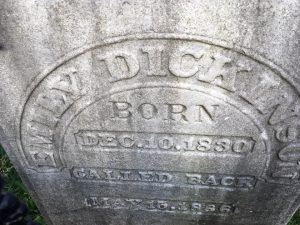
Poem Number 254
Hope is the thing with feathers
That perches in the soul,
And sings the tune without the words,
And never stops at all,
And sweetest in the gale is heard;
And sore must be the storm
That could abash the little bird
That kept so many warm.
I’ve heard it in the chillest land,
And on the strangest sea;
Yet, never, in extremity,
It asked a crumb of me.
Poem Number 764
My Life had stood – a Loaded Gun –
In Corners – till a Day
The Owner passed – identified –
And carried Me away –
And now We roam in Sovreign Woods –
And now We hunt the Doe –
And every time I speak for Him
The Mountains straight reply –
And do I smile, such cordial light
Opon the Valley glow –
It is as a Vesuvian face
Had let it’s pleasure through –
And when at Night – Our good Day done –
I guard My Master’s Head –
’Tis better than the Eider Duck’s
Deep Pillow – to have shared –
To foe of His – I’m deadly foe –
None stir the second time –
On whom I lay a Yellow Eye –
Or an emphatic Thumb –
Though I than He – may longer live
He longer must – than I –
For I have but the power to kill,
Without – the power to die –
Another item on my list is to see where the Bronte sisters grew up and wrote their books:
THE 50/50 PROJECT: Visiting the Bronte Vicarage at Haworth
The Blurb (from Goodreads):
The “volcanically sexy” (USA Today) bestseller about a widow and her daughter who take a young couple into their home in 1920s London.
It is 1922, and London is tense. Ex-servicemen are disillusioned; the out-of-work and the hungry are demanding change. And in South London, in a genteel Camberwell villa—a large, silent house now bereft of brothers, husband, and even servants—life is about to be transformed, as impoverished widow Mrs. Wray and her spinster daughter, Frances, are obliged to take in lodgers.
With the arrival of Lilian and Leonard Barber, a modern young couple of the “clerk class,” the routines of the house will be shaken up in unexpected ways. Little do the Wrays know just how profoundly their new tenants will alter the course of Frances’s life—or, as passions mount and frustration gathers, how far-reaching, and how devastating, the disturbances will be.
Short-listed for the Man Booker Prize three times, Sarah Waters has earned a reputation as one of our greatest writers of historical fiction.
My Thoughts:
Oh, Sarah Waters, how I love thee! Let me count the ways …
A tender and erotic love story, a sumptuous historical novel of post-war London, a gripping psychological suspense thriller, a clever murder mystery, a riveting courtroom drama, an eviscerating examination of English class and gender hypocrisies, a heart-breaking story of a young woman struggling to do what is expected of her against her every instinct and inclination … The Paying Guests is all this and more.
Sarah Waters is, I think, the most brilliant writer of our times. Her books are grand and deep and strong and powerful, but the pace is so swift and silky-smooth the pages just fly past. I have read all of her books now, and adored them all, and now I hunger for more, more, more. I am just going to have to read them all again while I wait.
The Paying Guests takes place just after the end of the First World War. Frances lives with her mother in a house that is much too large for them now. Her father and brothers are dead, and they can no longer afford servants. Bills are mounting up. So they decide to take in lodgers (though they call them by the more genteel name of ‘paying guests’).
The arrival of Leonard Barber and his wife Lilian shakes everything up. They are young, modern, a little vulgar. There are hints of tensions below the surface. Frances is fascinated despite herself. It is Lilian she is drawn to, and they slowly become friends.
It is impossible to describe any more of the plot without giving too much away. This is a story of slow burning suspense, and you must travel it step-by-step with Frances to truly feel the gradual inexorable tightening of the screw. Having finished it, I now want to read it all over again.
The Blurb (from Goodreads):
It's all a grand adventure when English Christy Mansel unexpectedly runs into her cousin Charles in Damascus. And being young, rich, impetuous, and used to doing whatever they please, they decide to barge in uninvited on their eccentric Great-Aunt Harriet—despite a long-standing family rule strictly forbidding unannounced visits. Because when the Gabriel hounds run howling over the crumbling palace of Der Ibrahim in the Lebanon, someone will shortly die.
A strange new world awaits Charles and Christy beyond the gates of Dar Ibrahim—"Lady Harriet's" ancient, crumbling palace in High Lebanon—where a physician is always in residence and a handful of Arab servants attends to the odd old woman's every need. But there is a very good—very sinister—reason why guests are not welcome at Dar Ibrahim. And the young cousins are about to discover that, as difficult as it is to break into the dark, imposing edifice, it may prove even harder still to escape.
My Thoughts:
Mary Stewart is one of my all-time favourite writers and I am just sorry she wrote so few books as I have loved them all. She’s one of my go-to writers when I am tired, or rundown, or unwell. I love her deft mix of romance and suspense, her exotic settings, and the ‘To Catch A Thief’ atmosphere of 1950s glamour and style. I simply cannot understand why all her books have not been made into movies.
The Gabriel Hounds (first published in 1967) begins when Englishwoman Christy Mansel unexpectedly runs into her cousin Charles in Damascus. Their fathers are twins, and very rich, and Christy and Charles are used to having their own way. Christy is about to head on to Lebanon, and Charles asks her if she plans to visit their Great-Aunt Harriet who lives there in an ancient walled palace, dressing like a man in a robe and turban and doing as she pleases (à la Lady Hester Stanhope). Christy is intrigued at the idea and so steals a march on Charles by dropping in uninvited. Her suspicions are aroused by the squalor of the half-ruined palace and the strange behaviour of her great-aunt. A storm maroons her there, but she manages to speak with Charles across the gushing torrent of water. She shares her concerns, and her cousin scales the walls of the seraglio to be with her. (I kid you not. Sigh).
And so begins a swift-paced tale of greed, treachery and murder that sees strong-willed, outspoken Christy tested to her limits. The setting is incredibly atmospheric, the romance sweet but fiery, and the denouement never fails to bring a little sting of happy tears to my eyes.
An oldie but a very good goodie.
Sarah Bailey is the Author of Into the Night, which I reviewed earlier this month. Here, she talks about her new book and the inspiration behind it....
Tell me about your new book.
WHERE THE DEAD GO will be released in August and is the third book in the Detective Gemma Woodstock series. In the first book, THE DARK LAKE, readers witnessed Gemma struggle with the homicide of a local high school teacher as she navigated some pretty hairy events in her personal life. This time Gemma is confronted with a tragedy that impacts her family and of course she is also tasked with solving a new case. A fifteen year old girl goes missing from a small coastal town near Byron Bay and her boyfriend turns up dead a few days later. Gemma is flown in to work out what has happened to both of them.
What was the first flash of inspiration for it?
Because this book is part of a series, I have been toying with a few different plot lines for a while. I am always thinking about what Gemma might get up to next!
When I started writing this book a year ago, I knew I wanted to deviate from a pure homicide storyline and had been thinking about exploring a missing person mystery. Then I read about a case in the US which prompted me to consider a scenario whereby it wasn’t clear if a missing person was the victim or the perpetrator, and I just created the story from there.
What do you love most in the world?
Lots of things! It probably goes without saying that I adore my two crazy and interesting children. I also don’t think you can beat the feeling you get when an idea starts to form. There is nothing quite like the potential of a new idea.
What do you fear most in the world?
I am terrified of injections and blood tests. I know it is completely irrational, but I lose it every time I need to get either. I had hoped to out-grow it but I actually think it’s getting worse.
What are your five favourite childhood books?
I loved Enid Blyton’s The Magic Faraway Tree and read it several times. I also loved The Secret Garden and The Hobbit. When I was a bit older, I couldn’t get enough of John Marsden’s Tomorrow When the War Began series and I must have read Anne of Green Gables about one million times. I read a lot as a child.
What are your 5 favourite books read as an adult?
It is virtually impossible to narrow it down to five. I think I would struggle to nail my top twenty! I have a huge soft spot for Tully by Paullina Simmons and I was blown away by Alex Garland’s The Beach when I first read it. I think The Great Gatsby is the perfect book and reread it every couple of years. More recently I loved Conversations With Friends by Sally Rooney and thought that Behind Her Eyes by Sarah Pinborough was one of the best thrillers I have ever read.
What books might we be surprised to find on your shelves?
I read fairly widely. I enjoy most literary fiction, I really like mainstream fiction and lately I have gotten into non-fiction and memoirs. Anything that sucks me in has my vote. I’m not sure that there is anything that would be especially surprising although people might expect to find more crime fiction. Perhaps the sheer volume of books might be a bit shocking!
How would you describe perfect happiness?
It depends entirely on my mood. I am fairly mercurial. Sometimes my favourite thing is to go out to an amazing restaurant or a fun bar with a bunch of friends and eat, drink and enjoy debating the hot topics of the day. Other times all I want is to be home on the couch with my kids watching a movie or reading a book. I’m very social but I enjoy my downtime too.
What are your dreams for the future?
I have many! I want to write more books and have lots of plot ideas already. I also want to try my hand at a screenplay. But I am also passionate about my career in advertising and have huge ambitions for the agency I currently manage, and the success I think it can have. I guess I’m going to be busy!
Click here to read my book review of Sarah Bailey's Into the Night:
BOOK REVIEW: Into The Night by Sarah Bailey
The Blurb (from Booktopia):
A fascinating, insightful and inspiring account of a novice beekeeper's year of keeping honeybees, which will appeal to readers of H is For Hawk and The Outrun
Entering her thirties, Helen Jukes feels trapped in an urban grind of office politics and temporary addresses – disconnected, stressed. Struggling to settle into her latest job and home in Oxford, she realises she needs to effect a change if she’s to create a meaningful life for herself, one that can accommodate comfort and labour and love. Then friends give her the gift of a colony of honeybees – according to folklore, bees freely given bring luck – and Helen embarks on her first full year of beekeeping. But what does it mean to ‘keep’ wild creatures? In learning about the bees, what can she learn of herself? And can travelling inside the hive free her outside it?
As Helen grapples with her role in the delicate, awe-inspiring ecosystem of the hive, the very act of keeping seems to open up new perspectives, deepen friendships old and new, and make her world come alive. A Honeybee Heart Has Five Openings is at once a fascinating exploration of the honeybee and the hive, the practices of honey-gathering and the history of our observation of bees; and a beautifully wrought meditation on responsibility and care, on vulnerability and trust, on forging bonds and breaking new ground.
My Thoughts:
I have always been fascinated by bees, and imagine myself living in the country one day with a huge garden full of flowers and my own bee hives. I have quite a collection of books about bees in my library, and bought this beautiful volume as soon as I saw it.
A Honeybee Heart Has Five Openings is a delicate and sensitive memoir of one young woman’s year of keeping bees. Helen Jukes has just moved to Oxford for a new job, but finds herself ground down by the long hours and high stress. One day, unable to stay inside a moment longer, she steps out into the frosty garden at dusk. It’s very small – only fifteen strides to the end – and is bordered by a wild hedge and brambles. For a moment, standing beneath a holly bush, she finds a moment of peace. Here is where the bees would be, she thinks. The thought takes her by surprise, but takes root in her imagination.
The term ‘beekeeper’ enthralls her. ‘In truth … I’m not so well versed in keeping things,’ she writes. She begins to read up on bees – the myth and folklore and science of the long history of their symbiotic relationship with humans. Much of this I have read before, but Helen Jukes has a poetic turn of phrase that lifts her out of the ordinary: ‘a bee lands on my hand and I lift her up to see the mandibles. Everything about her is somewhere between reaching and receiving; she probes the world, tastes and touches it, as she bites and chews it.’
Slowly the thought becomes reality. She orders the hive and friends give her a swarm of honeybees (according to folklore, bees freely given bring luck). As she cares for the bees, and studies them, she finds her understanding of the world about her changing. She has a new perspective, a new way of seeing: ‘(I’ve been) learning how to feel better, and what it means to look and listen and speak; how to define keeping as an action, a doing, and how a colony is generated and grows; how hives and homes and heads are each a kind of inner place, each voicing something about who we are and how we relate to our wider landscapes …’
A truly beautiful book.
The Blurb (from Goodreads):
In 1942, Europe remains in the relentless grip of war. Just beyond the tents of the Russian refugee camp she calls home, a young woman speaks her wedding vows. It’s a decision that will alter her destiny…and it’s a lie that will remain buried until the next century.
Since she was nine years old, Alina Dziak knew she would marry her best friend, Tomasz. Now fifteen and engaged, Alina is unconcerned by reports of Nazi soldiers at the Polish border, believing her neighbors that they pose no real threat, and dreams instead of the day Tomasz returns from college in Warsaw so they can be married. But little by little, injustice by brutal injustice, the Nazi occupation takes hold, and Alina’s tiny rural village, its families, are divided by fear and hate. Then, as the fabric of their lives is slowly picked apart, Tomasz disappears. Where Alina used to measure time between visits from her beloved, now she measures the spaces between hope and despair, waiting for word from Tomasz and avoiding the attentions of the soldiers who patrol her parents’ farm. But for now, even deafening silence is preferable to grief.
Slipping between Nazi-occupied Poland and the frenetic pace of modern life, Kelly Rimmer creates an emotional and finely wrought narrative that weaves together two women’s stories into a tapestry of perseverance, loyalty, love and honor. The Things We Cannot Say is an unshakable reminder of the devastation when truth is silenced…and how it can take a lifetime to find our voice before we learn to trust it.
My Thoughts:
In her new novel, Kelly Rimmer weaves together two first-person points-of-view. One is set now, and the other in Poland during the terrible years of the Nazi occupation. I love dual timeline novels, but usually I prefer the story set in the past. This book is so perfectly balanced and the contemporary voice so strong and real, that I found myself loving both.
In the story set now, Alice has devoted her life to caring for her son, Eddie, who has autism spectrum disorder. She has put aside her own plans and, indeed, her own needs, to make sure that he is safe and managing the best he can in a world that overwhelms him. But Alice’s beloved grandmother is dying, and she has made one last request of Alice. Go to Poland, she says. Or, at least, that is what Alice thinks she says. Her grandmother has lost the ability to speak, due to a stroke, and Alice must try to understand what her Babcia wants, just as she is constantly struggling to understand her son.
Babcia has a box of memories: an old photograph, a baby’s shoe, and a letter. These are the only clues Alice has to find out what happened to her grandmother so long ago in Poland.
The story moves back then to 1942, where Alina is a young woman in love. But the German invasion turns her life upside-down. Tomasz, her betrothed, is trapped in Warsaw and Alina and her family are struggling just to survive. Slowly the two stories unspool, the dramatic tension increasing until I could not tear myself away from the pages. Alina’s fear and her bravery, her grief and her resolve, made her a very sympathetic heroine and I was so hoping all would work out for her and Tomasz.
It was Alice’s story that surprised me the most, however. Her quest to help her grandmother, her love for her family, and the way she grew over the course of the narrative was so moving, I ended the book with a great big lump in my throat. Cleverly constructed and beautifully written, this is a book that deserves to win a great many accolades and a wide audience.
Another great book that you might love to read:
The Blurb (from Goodreads):
What if your estate agent could find you not just your perfect house, but your perfect job, your perfect partner... your perfect new life?
On paper, Iris Atkins is an estate agent, but she's not just good at finding suitable houses for her clients. In fact, she has a gift: Iris is able to see into their lives and understand exactly what is missing and what they need - and not just in bricks-and-mortar terms either.
Of course, concentrating so much on fixing other people's problems doesn't leave much time for examining your own. Over the course of one whirlwind year Iris discovers that while she may know what's best for everyone else, she doesn't necessarily know what's best for herself - and what she finds out could make her happier than she'd ever dreamed of.
My Thoughts:
This is a charming romantic comedy just crying out to be made into a light-hearted, feel-good rom-com. It has everything – gorgeous English country cottages, a grieving widower finding new love, a young couple negotiating the difficulties of balancing work and family, and a beautiful real estate agent so busy fixing up everyone else’s lives that she has no time to worry about her own.
It’s the perfect read for anyone who’s a little tired or down-hearted, and wants a few hours of comfort and escape. The various romances are described with a light, deft hand, the pace is swift but smooth, and all the characters are given sufficient space to grow and win our sympathy.
Sometimes I think I should be employed as a story scout for film companies! Because this one would be a hit for sure.
Another book with a beautiful house at the heart:
https://kateforsyth.com.au/what-katie-read/book-review-the-peacock-summer-by-hannah-richell
The Blurb (from Goodreads):
When Celia Sands arrives at a remote Italian villa to star in the first performance of a deceased playwright's masterpiece, she is instantly drawn to the mysteries surrounding the play -- and to her compelling, compassionate employer.
My Thoughts:
This is my sixth novel by Susannah Kearsley, who writes gentle romantic suspense novels that move back and forth between contemporary and historical times. As you all know, I love a good parallel narrative, particularly if it also has a bit of love and danger thrown into the mix. Add a touch of magic, as Susannah Kearsley often does, and I’m a happy camper.
Season of Storms is not her strongest novel. It hasn't challenged The Rose Garden or A Desperate Fortune or Mariana for top-ranking in my affections. However, it is still a very pleasurable and relaxing read, and of course I loved the setting on Lake Garda in Italy (I’ve spent quite a lot of time at Lake Garda, which is one of the key settings for my novel Bitter Greens).
The story centres on a young actress named Celia Sands who travels to a villa in Italy to star in the first-ever production of a play written by a now-dead playwright. He wrote the play for his lover – an actress also named Celia Sands – but after her disappearance, the play was never performed. The villa is populated by various intriguing characters – a conniving Italian seductress, a flirtatious theatrical producer, a kind but ageing actress, her much younger stud boyfriend, a menacing workman, and – of course – the handsome but inscrutable young owner of the villa. There are also a few rambunctious dogs, which always improves a story, I find.
There is also – maybe – a ghost.
The story contains no surprises whatsoever, but that did not trouble me in the slightest. It’s the kind of warm comfortable read that goes with trackies and slippers and a steaming cup of tea, while rain pelts down outside and you sneak the fire on, even though it’s probably not that cold. Susannah Kearsley is an elegant and intelligent writer, and there’s just enough intrigue to keep me interested without disturbing my pulse rate. And I’ll continue stockpiling her books, in preparation for another rainy miserable day just made for curling up in front of the fire with a cuppa.